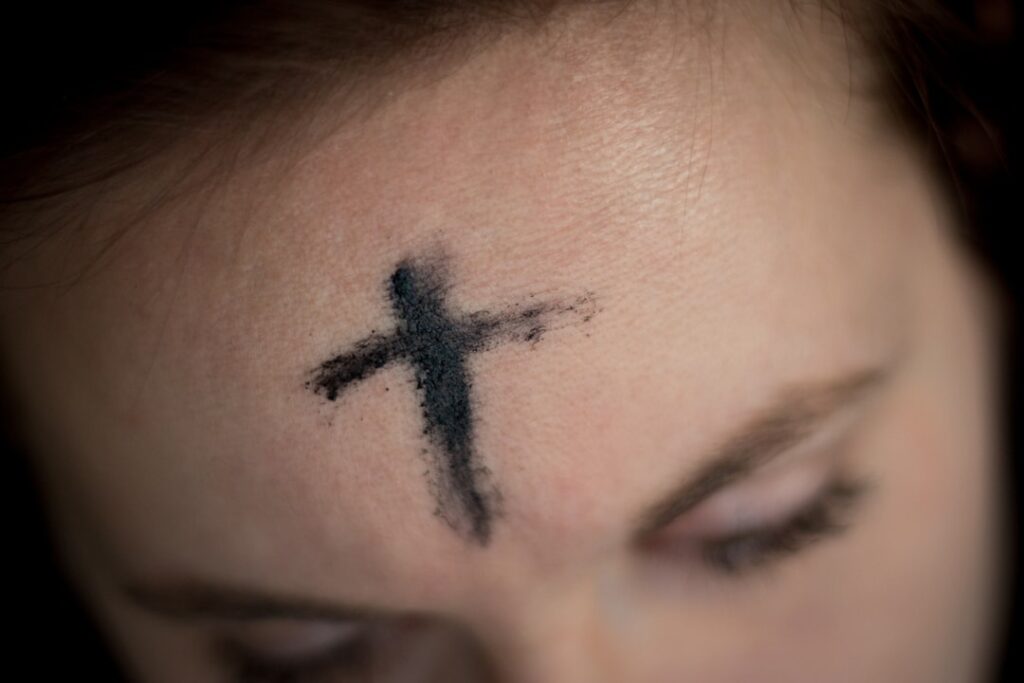Moreover when you fast, be not, as the hypocrites, of a sad countenance: for they disfigure their faces, that they may appear unto men to fast. Verily I say unto you, they have their reward. But you, when you fast, anoint your head, and wash your face; that you appear not unto men to fast, but unto your Father who is in secret: and your Father, who sees in secret, shall reward you openly.
-Matthew 6: 16-18
For those of us in the southern hemisphere, Ash Wednesday can take us by surprise. We antipodeans have just been through all the joys of Christmas, the excitement of New Year, the relaxation of the summer’s break and the anxiety of the first day of work, school or university; and then, in the midst of all these moments- by the way- it’s Ash Wednesday next week. Then there is that flash of realisation- you haven’t spent one moment deciding what you will give up for Lent. Which is followed by a mad scramble to try and remember whether you gave up sugar or coffee last year; and then based on that memory, you decide to give up the other one. You then gulp down a quick five cups of coffee (with plenty of sugar just in case) to build up a bit of a surplus for the next forty days- and thus, our Lenten preparation is complete. Hardly the stuff of a holy life. Yet, life is busy and our rhythms are far from those of the Church’s calendar. Ash Wednesday, because it generally lands in summer, can seem a little out of place for us. It especially does so if you have lived through one or several Lenten seasons in the northern hemisphere. Lent makes more sense at the end of winter as we emerge into the joys of Easter and its spring. But that is no excuse. There is no northern conspiracy against us.
There is probably no more appropriate time for Catholics to take the Church’s calendar seriously than right now. The pattern of liturgical life is such an obvious cultural marker. No meat on Friday, fasting on Ash Wednesday and the abstinence of ember days are all cultural institutions that create within the lives of Catholics a certain identity and a shared sense of purpose. At Friday lunch time, when you see the person in the line in front of you- and he goes to great pains to explain to the server that he wants any sandwich in the window that does not have meat- you give him a knowing nod and you both understand who you are and where you stand. Unless you are in the inner-West of Sydney- then he is possibly a vegan and he stands in opposition to everything you hold dear. But that gives you a chance to do a bit of apostolate and a chance to evangelise. Right before the police hall you away for having committed the intolerable offence of some ‘micro-aggression’. That is certainly one way of making up for your rushed preparation for Lent and do some actual penance.

But it is true, the collapse in the Church’s culture means that we are very much a fish out of water. And the thing we hold most precious- our Catholic Faith- is out of sync with a world that is decidedly out of order. We can go for weeks without the slightest inclination to meat, but come Ash Wednesday- everywhere you look- the only thing you see is bacon. There seems to be a slice of ham around every corner. It is quite incredible just how many temptations intrude upon your consciousness at the moment when you are called upon to make the slightest sacrifice- that is really only an inconvenience. Hardly a hardship.
Penance in the life of a Christian serves a specific purpose that is foreign to other religions- especially the Judaism from which we emerged. The Jews went to great pains to create a culture around the idea of clean and unclean. It was not merely a cultural marker; it was a spiritual preparation in order to know that the truths of God were in opposition to the truths of a fallen world. The Jews were being prepared to be God’s people- to be set apart- hence the distinction between clean and unclean. Into this religious and cultural edifice steps the Lord Jesus, who declares all things clean (Mk 7:19). Nothing would be off limits to the Christian, so long as it remained within the confines of its natural use and God’s order. We were free to eat pork and lobster- but we were left wondering- how do we no orientate ourselves in the world? How does one follow Christ and distinguish himself from a world that was still fallen, when the world itself was no longer off limits? This makes our penance and sacrifice crucial to our Christian life. It is not a matter of law- it is a question of heart.
We make the choice to not eat meat on Friday or to fast on Ash Wednesday, not as a relic from a superstitious past; when we thought mortal doom loomed behind a misshapen potato. Rather we forgo so as to become like Christ. The Church’s discipline of abstinence and fasting is the very touchstone of Christian Tradition. We do not conform ourselves to the tastes of a passing world, rather we take on the Person of Christ (Rom 13:14). And this we do by following Him in all things- His sacrifices and generosity being paramount amongst them (Col 3: 5-10). So, let us spend a little time in this moment preparing for that season which prepares us for Christ’s great sacrifice (Rom 12:11). Let me give you a few specific suggestions about how to choose your Lenten penance.

Time and hopefully a little wisdom has taught me that there are three principal criteria that make for a good Lenten penance.
Make it one thing.
We oftentimes consider the idea of choosing a number of things to give up for our Lenten penance- e.g., sugar, snacks and wine. The desire to give up multiple things is generally moved by a genuine desire to be generous; and probably because of the realisation that you have been rather slack in your penances and Lent is a time to ‘catch up.’ Fair enough- we are all a little behind when it comes to making sacrifices. It is however, generally an unwise idea. I say this perhaps as more of a confession of own weakness than yours- but when you choose more than one thing, you can be tempted to play them off against each other: “well, I have been very good at not having sugar, so one glass of wine- because I am having dinner with friends- will be ok.” Since you have given up two things, a slip up in one seems like a small thing. Really, all you are doing, is tailoring your sacrifices to your whims- and not actually renouncing anything in particular. You also are tempted to go through the whole- “I‘ll make up for it tomorrow” story that we tell ourselves. That is not a sacrifice- that is meal prep. The purpose of penance is reform. And reform requires genuine detachment- not just the going without from occasion to occasion that we practice as our Lenten penance. Wisdom would suggest that choosing one thing- and choosing it well- does more honour to the Church’s Tradition. And it is far easier for you to keep track of just how well- or how poorly- you are doing.
Make it manageable.
On occasions- especially converts, reverts and young people- they try and give up something heroic, like water or solid food. (I may have exaggerated in my examples- but you all know of the temptation of which I speak.) It most likely springs from a genuine desire to be generous, but it usually collapses into a pool of over confidence and failure. Don’t try and give something up beyond your power. In a way, that is demanding grace from God without your will having been prepared to cooperate with it. Wisdom dictates that you give up something commensurate with your state in life and your acquired level of cooperation with grace. This is not because you want to play it safe and stay within your lane– it is so that your sacrifice does not become penance for those around you. You are meant to mortify your own flesh- not others’. Since you have taken on a load you cannot bear, in way, you force those around you to carry some of it- to put up with your crankiness or irritableness because you are not drawing closer to God, you are just realising how far you are from Him. That is not a Lenten sacrifice that is well ordered. Choose that which grace allows- not what your imagination may desire.
Make it repeatable
A good Lenten penance is one that you can practice multiple times in a day. It is never a once-a-week kind of thing. It is too easy for us to steel our nerve in order to do something on a handful of occasions, rather than something that requires the attention and patience of having to do it several times a day. The reason why this is a better penance, is because penance is meant to reform our will, which means our will must be exercised. Much like physical exercise, doing something once a week is not a very effective way of increasing our resistance. Likewise, doing a bit of penance every so often, does not strengthen our will. Choose something that gives you an opportunity on multiple occasions to re-order you will and conform your life to the Lord’s.
As Catholics, our penance should be merry and our celebrations full of gravitas. Everything we do is a constant reminder of the perfection of all being that is our Triune God, and the rather miserable creatures that we have turned ourselves into. Yet despite this gulf, there is the wonderous truth that the Lord himself became like us so that we might become like Him. There is always a touch of joy at the heart of our penances; and a subtle reminder of our sorrow in our festivities. I leave you with a quote from G.K. Chesterton, who always seems to have the knack of summing up the paradox at the heart of all we do:
“And as I close this chaotic volume I open again the strange small book from which all Christianity came; and I am again haunted by a kind of confirmation. The tremendous figure which fills the Gospels towers in this respect, as in every other, above all the thinkers who ever thought themselves tall. His pathos was natural, almost casual. The Stoics, ancient and modern, were proud of concealing their tears. He never concealed His tears; He showed them plainly on His open face at any daily sight, such as the far sight of His native city. Yet He concealed something. Solemn supermen and imperial diplomatists are proud of restraining their anger. He never restrained His anger. He flung furniture down the front steps of the Temple, and asked men how they expected to escape the damnation of Hell. Yet He restrained something. I say it with reverence; there was in that shattering personality a thread that must be called shyness. There was something that He hid from all men when He went up a mountain to pray. There was something that He covered constantly by abrupt silence or impetuous isolation. There was some one thing that was too great for God to show us when He walked upon our earth; and I have sometimes fancied that it was His mirth.”
― G.K. Chesterton, Orthodoxy

